
Updated 2024 Approved Achieving Clarity in Soundscapes Innovative Techniques for Minimizing Audio Distractions, Online/Offline

Achieving Clarity in Soundscapes: Innovative Techniques for Minimizing Audio Distractions, Online/Offline
Videos are like a hook that keeps us engaged for a good long time. Similarly, they are a great medium of information and entertainment. Good video content help us learn better and to memorize the information in it. However, this can be a problem when videos have issues like annoying background noises. Even distortion or jittery sound can turn a good-quality video into a poor source.
Nevertheless, there is a solution to almost every problem. There are tools that can help to remove distortion and background noises from a video. Such tools will help you reduce audio noise in the background or any distortion in your media file. You can download such software that will help you denoise your media content. In this way, your content will sound crispier and sharper with better audio quality.
Part 1: What Are The Benefits of Audio Denoising in Videos?
There are tools that will help you reduce noise from audio without any hassle. Such tools are very useful when it comes to removing distortion from your audio files. You can also denoise your files, but first, learn some of the benefits of audio denoising.
1. Clear Sound Quality
Audio denoising help to clear any unwanted noise, hiss, or any other background voice. This feature helps to improve the overall listening experience of the user. Once all the distortion is removed, the audio of your project will sound better and more polished.
2. Optimized Communication
Having clear and clean audio is important in videos for effective communication. Moreover, it makes sure that viewers can easily understand the dialogue or message. Better sound quality also improves the overall communication within the project or a video.
3. Professional and Factual
When there’s background noise or disturbances in the audio, the content appears to be faulty. It also can make the video less professional and not as trustworthy. If we remove the background noise, it helps the video to look more meaningful and professional.
4. Enhanced Audience Involvement
Clean sound keeps people interested and helps them stay attentive to the story. Moreover, people tend to be hooked more to the information in the video. It helps viewers to stay engaged, follow what’s happening, and enjoy watching the video.
5. Availability and Diversity
Reducing background noise makes the speech clearer and easier to follow. Additionally, when subtitles or captions are available, then it makes the video more captivating. This makes the videos more accessible to more people with diverse backgrounds.
6. Adjustable Editing Opportunities
Removing unwanted noise from the audio while editing a video gives us more flexibility. By doing so, you can work on your project later. Clean audio allows us to make accurate changes to the sound, like adjusting the volume or adding effects. Additionally, it makes your audio file better than before.
7. Uniformity and Uninterrupted Flow
By eliminating noise, each video part will have a similar sound profile. Meanwhile, this will create a smooth and uninterrupted audio experience for the viewers. Consistent audio quality is important in providing a seamless and unified viewing experience.
8. Audio Reconstruction
Eliminating such noises from audio is very helpful for fixing older or damaged recordings. It enhances the quality and makes it easier to understand audio. You can even reconstruct your old audio files and keep them safe. This will also help you to improve the quality of your old audio files.
Part 2: Wondershare Filmora: How To Denoise Audio Properly?
Wondershare Filmora is a comprehensive video editing software that features many effective video management tools . From video editing to denoise audio editing, everything is possible in Filmora. For those who are new to this tool, Filmora makes it very easy to manage such videos. To know how you can using Wondershare Filmora, look below into the steps:
Reduce Video/Audio Noise For Win 7 or later(64-bit)
Reduce Video/Audio Noise For macOS 10.14 or later
Step 1Add Audio with Noise on Filmora
On opening Filmora on your computer, continue to select the “New Project” button from the home screen. As this opens a window, continue to the “Import” options to add in the video or audio that needs editing. Drag and drop it to the timeline to continue with free audio noise removal.
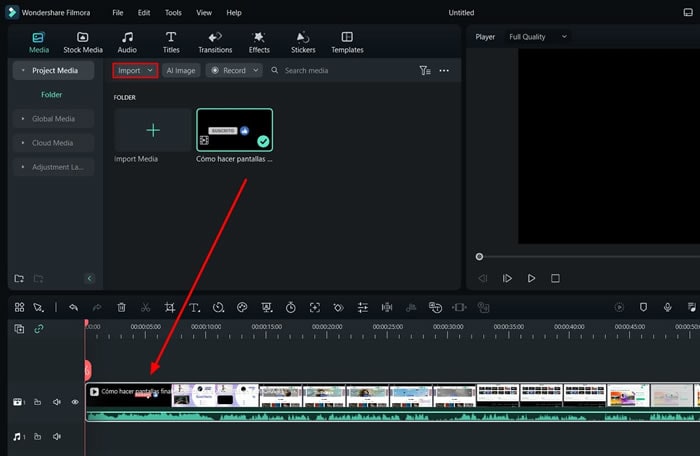
Step 2Adjust Audio Settings
As the media is imported successfully, right-click to open a list of options. Select “Adjust Audio” from the drop-down menu to open the audio settings on the screen.
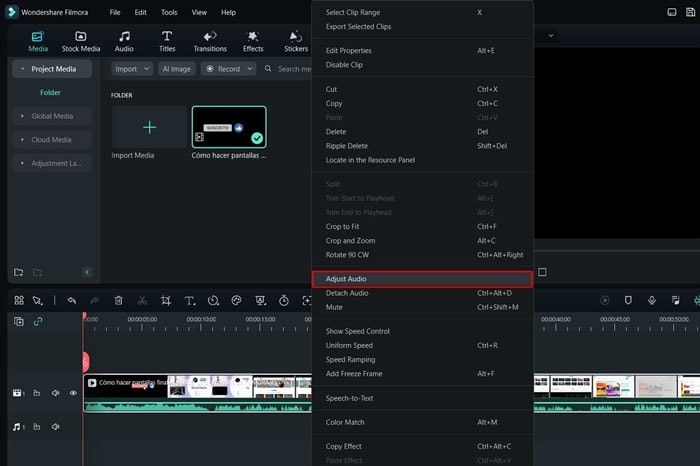
Step 3Successfully Denoise Audio
In the “Denoise” section, you can activate options such as “AI Speech Enhancement,” “Wind Removal,” and “Normal Denoise.” Also, you can set the sliders of “DeReverb,” “Hum Removal,” and “Hiss Removal.” After correcting the audio, click the “Export” button for opening the window to save the final product.
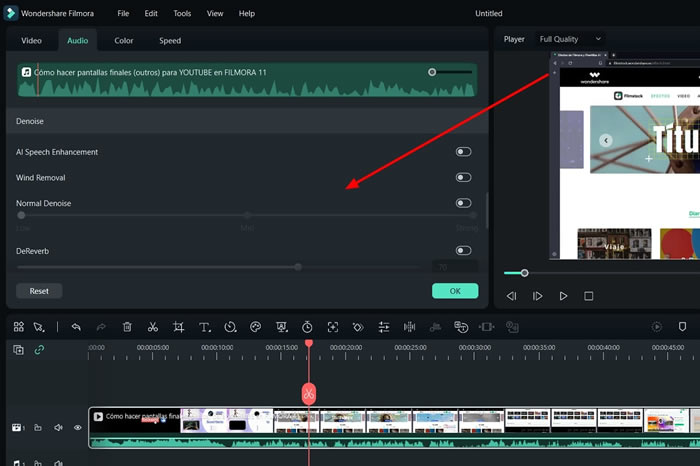
Part 3: Online Solutions: Reduce Audio Noise With The Right Tools
Your noise distortion or annoying background sounds is no more a hassle. These top 3 free audio noise removal online tools will help you with your problem. In this section, the steps of how to use these audio deniosers are also provided.
1. Media.io
Media.io is one of the most comprehensive video enhancers and editors out there. It can improve the quality of your images and also can edit your videos in a breeze. Besides this, it is also a great online audio noise reducer. You can import your audio files and simply let the tool eliminate all the distortion from your file.
Step 1: Access the online tool by going to its website. As you continue next, select the “Remove Noise Now” button to lead to a new window. Then, drag and drop your audio file from your system.
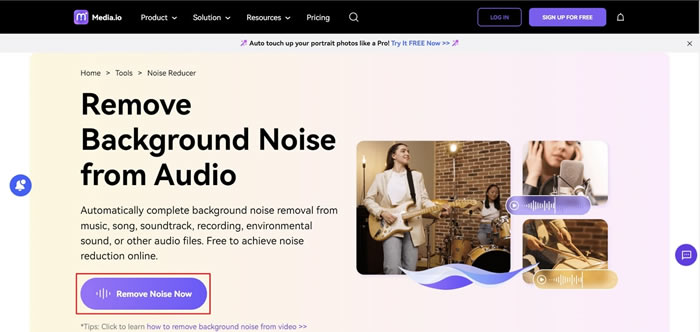
Step 2: Next, in the “Noise Reducer,” select the type of noise you want to remove from your audio file. You can select any of the provided options for removing the type of noise present in your content. Once selected, select the “Reduce noise now” button to initiate the process.
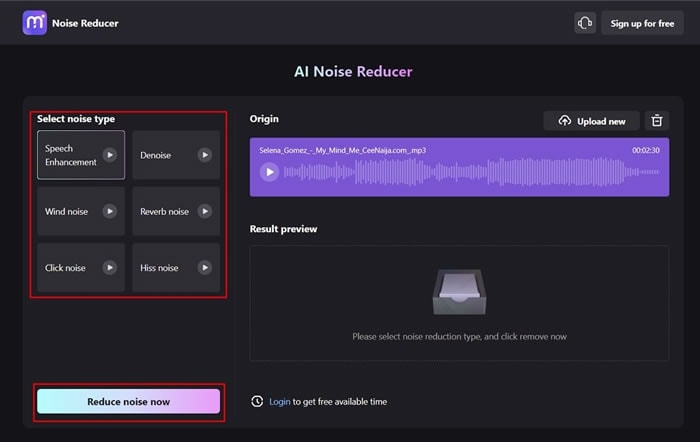
Step 3: Continue to preview your audio file under the “Result Preview” option. Proceed to download the file once completed by pressing “Download.”
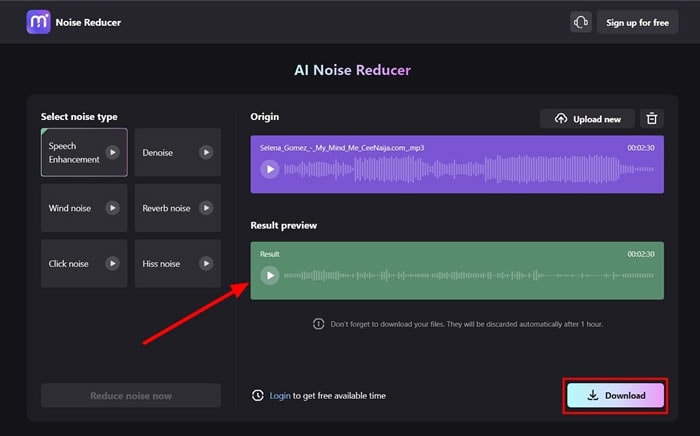
2. Veed.io
This online video editor provides a diversity of features to its users with qualitative assurance. Not only can you edit videos, but Veed.io provides the feasibility of editing audio. If you have recorded content with background noise, it can be easily removed using Veed.io . To know how this noise cancelling online tool works, follow the steps as follows:
Step 1: On opening the browser screen and navigating to the official link of Veed.io, click the “Clean your audio now” button.

Step 2: You will be led to a new window where you can add the distorted video or audio. Open importing it successfully on Veed.io, continue to the “Settings” section from the left, and look for the “Audio” settings.
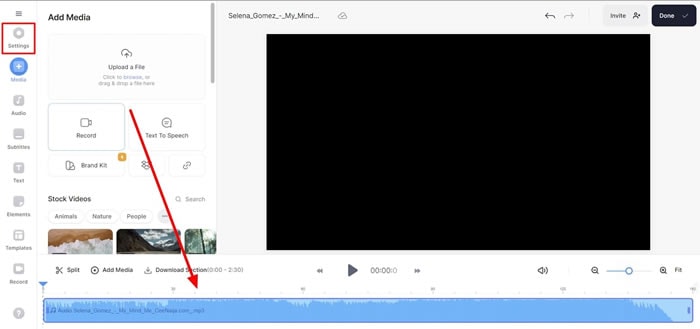
Step 3: To remove background noise from the audio, click the “Clean Audio” button and access “Done” from the top-right corner. Continue to export the video successfully from Veed.io background noise remover.
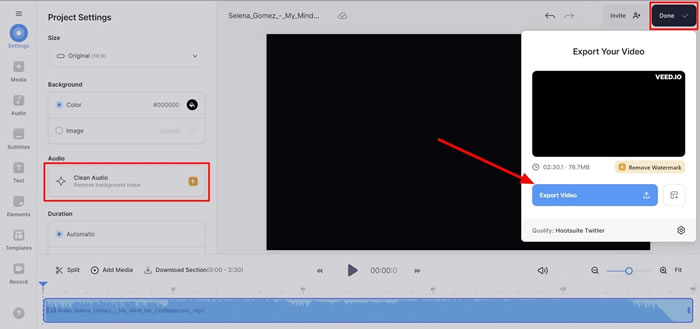
3. Kapwing
Another impressive online video editor, Kapwing , provides its users with the option of removing noise from audio. With a clean and simple interface, it is not difficult to reduce audio noise through Kapwing. For an understanding of how this audio noise reduction online free tool works, follow the steps below explaining the operations of Kapwing:
Step 1: As you access the online webpage of Kapwing, click the “Upload video or audio” button to continue further.
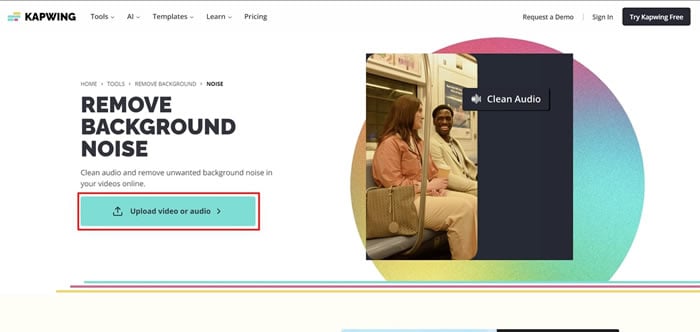
Step 2: As you tap the “Upload” button on the new window and add your video, a new editing section opens on the right panel.
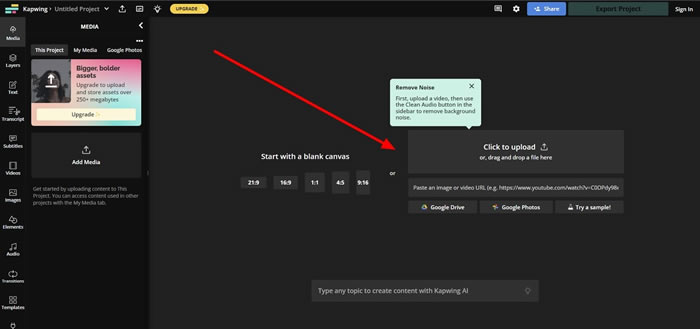
Step 3: Look for the “Clean Audio” button in the “AI Tools” section on the right to remove the audio noise from the added media. Once it is done, click the “Export Project” button on the top to download the edited video successfully.
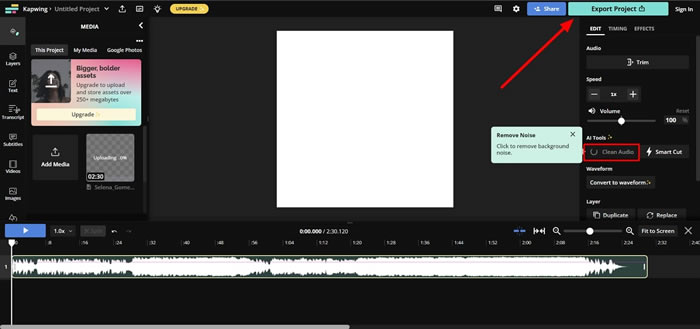
Conclusion
To conclude, videos are a great source of entertainment and information for almost everyone. So, why go for a video with too much distortion and jitters? Wondershare Filmora has added an excellent feature to denoise your video or audio files . This tool has a feature to reduce or remove background noises or distortion from your videos. With this feature, your video files will have a more clear and sharp audio sound.
Reduce Video/Audio Noise For Win 7 or later(64-bit)
Reduce Video/Audio Noise For macOS 10.14 or later
Reduce Video/Audio Noise For macOS 10.14 or later
Step 1Add Audio with Noise on Filmora
On opening Filmora on your computer, continue to select the “New Project” button from the home screen. As this opens a window, continue to the “Import” options to add in the video or audio that needs editing. Drag and drop it to the timeline to continue with free audio noise removal.

Step 2Adjust Audio Settings
As the media is imported successfully, right-click to open a list of options. Select “Adjust Audio” from the drop-down menu to open the audio settings on the screen.

Step 3Successfully Denoise Audio
In the “Denoise” section, you can activate options such as “AI Speech Enhancement,” “Wind Removal,” and “Normal Denoise.” Also, you can set the sliders of “DeReverb,” “Hum Removal,” and “Hiss Removal.” After correcting the audio, click the “Export” button for opening the window to save the final product.

Part 3: Online Solutions: Reduce Audio Noise With The Right Tools
Your noise distortion or annoying background sounds is no more a hassle. These top 3 free audio noise removal online tools will help you with your problem. In this section, the steps of how to use these audio deniosers are also provided.
1. Media.io
Media.io is one of the most comprehensive video enhancers and editors out there. It can improve the quality of your images and also can edit your videos in a breeze. Besides this, it is also a great online audio noise reducer. You can import your audio files and simply let the tool eliminate all the distortion from your file.
Step 1: Access the online tool by going to its website. As you continue next, select the “Remove Noise Now” button to lead to a new window. Then, drag and drop your audio file from your system.

Step 2: Next, in the “Noise Reducer,” select the type of noise you want to remove from your audio file. You can select any of the provided options for removing the type of noise present in your content. Once selected, select the “Reduce noise now” button to initiate the process.

Step 3: Continue to preview your audio file under the “Result Preview” option. Proceed to download the file once completed by pressing “Download.”

2. Veed.io
This online video editor provides a diversity of features to its users with qualitative assurance. Not only can you edit videos, but Veed.io provides the feasibility of editing audio. If you have recorded content with background noise, it can be easily removed using Veed.io . To know how this noise cancelling online tool works, follow the steps as follows:
Step 1: On opening the browser screen and navigating to the official link of Veed.io, click the “Clean your audio now” button.

Step 2: You will be led to a new window where you can add the distorted video or audio. Open importing it successfully on Veed.io, continue to the “Settings” section from the left, and look for the “Audio” settings.

Step 3: To remove background noise from the audio, click the “Clean Audio” button and access “Done” from the top-right corner. Continue to export the video successfully from Veed.io background noise remover.

3. Kapwing
Another impressive online video editor, Kapwing , provides its users with the option of removing noise from audio. With a clean and simple interface, it is not difficult to reduce audio noise through Kapwing. For an understanding of how this audio noise reduction online free tool works, follow the steps below explaining the operations of Kapwing:
Step 1: As you access the online webpage of Kapwing, click the “Upload video or audio” button to continue further.

Step 2: As you tap the “Upload” button on the new window and add your video, a new editing section opens on the right panel.

Step 3: Look for the “Clean Audio” button in the “AI Tools” section on the right to remove the audio noise from the added media. Once it is done, click the “Export Project” button on the top to download the edited video successfully.

Conclusion
To conclude, videos are a great source of entertainment and information for almost everyone. So, why go for a video with too much distortion and jitters? Wondershare Filmora has added an excellent feature to denoise your video or audio files . This tool has a feature to reduce or remove background noises or distortion from your videos. With this feature, your video files will have a more clear and sharp audio sound.
Reduce Video/Audio Noise For Win 7 or later(64-bit)
Reduce Video/Audio Noise For macOS 10.14 or later
“Incorporating Sound: Techniques for Embedding Audio in QuickTime Media”
How to Add Audio to QuickTime Video Files

Shanoon Cox
Mar 27, 2024• Proven solutions
Sometimes you may want to replace the original audio of a QuickTime video or add your own audio file. Instead of compressing the video again, Wondershare Filmora (originally Wondershare Video Editor) makes it really easy to do this in just a few steps. Now follow the detailed guide below to learn how to easily add audio to QuickTime video files. You can download this software first:
How to Add Audio to QuickTime Video Files
 Download Mac Version ](https://tools.techidaily.com/wondershare/filmora/download/ )
Download Mac Version ](https://tools.techidaily.com/wondershare/filmora/download/ )
1 Import your QuickTime video files to the program
After you install this video editor, click the shortcut on the desktop to launch it. Then a window will pop up to let your select the aspect ratio between 16:9 and 4:3. After making your choice, click the “Import” button or drag and drop your QuickTime video & audio files to this program. Since this program supports a vast range of formats, you don’t have to convert the original video format to edit it.
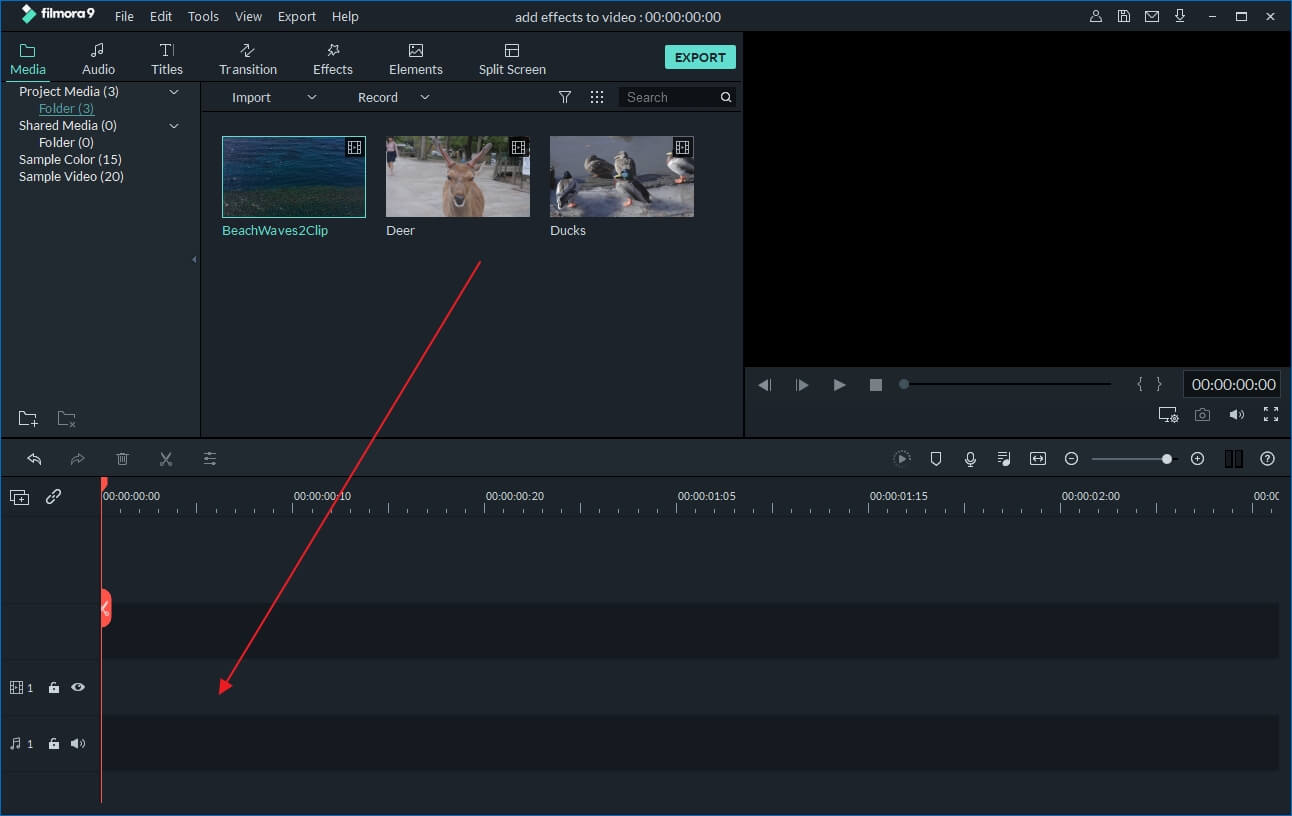
2 Add audio to QuickTime video files
After that, place both of the video and audio files to the corresponding tracks of the timeline. Make sure that the lengths of them are approximately the same. If not, you would need to edit the video and or audio streams (for example, deleting unnecessary fragments) in order to make their lengths equal. You can click the “Split” icon above the Timeline to split and cut the unwanted part of the files. After syncing the video and audio files perfectly, you can right click and further adjust the audio file in the editing panel, like changing the playing speed, volume, pitch, etc.
Tip: You can also replace the original soundtrack of the QuickTime video file. To do this, just right click the video file and choose “Audio Detach”. Then the audio file will appear on the audio track. Then right click the audio file and choose “Delete” to delete the audio.
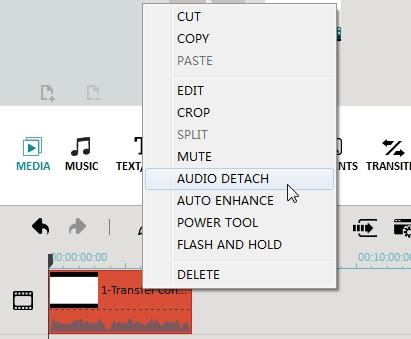
3 Export the new video file
After adding audio to the QuickTime video, hit the “Create” to export your video file. You can go to the “Format” tab to save the new video file in different formats. Or go to the “Device” tab if you want to watch the new file on your portable media device like iPod, iPhone, etc. There will be dozens of preset output profiles for converting your video file to almost every kind of media devices like iPod, iPhone, Xbox 360, mobile phones and different players. You can also directly share your video on YouTube or Facebook in the “YouTube” tab or burn to a DVD if you like.
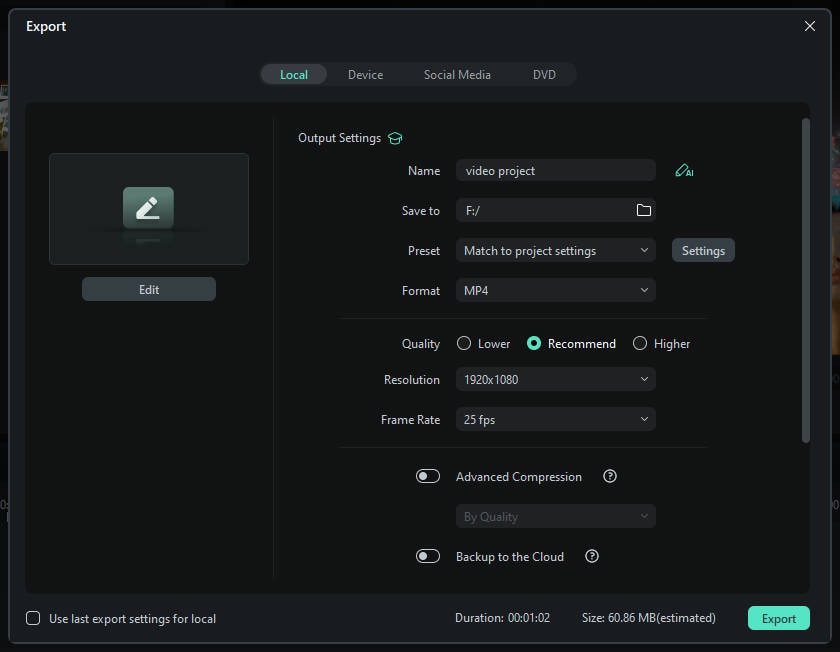
Watch the video below to check how to edit videos with Filmora video editor.
 Download Mac Version ](https://tools.techidaily.com/wondershare/filmora/download/ )
Download Mac Version ](https://tools.techidaily.com/wondershare/filmora/download/ )
You may also interested in: How to edit video with QuickTime

Shanoon Cox
Shanoon Cox is a writer and a lover of all things video.
Follow @Shanoon Cox
Shanoon Cox
Mar 27, 2024• Proven solutions
Sometimes you may want to replace the original audio of a QuickTime video or add your own audio file. Instead of compressing the video again, Wondershare Filmora (originally Wondershare Video Editor) makes it really easy to do this in just a few steps. Now follow the detailed guide below to learn how to easily add audio to QuickTime video files. You can download this software first:
How to Add Audio to QuickTime Video Files
 Download Mac Version ](https://tools.techidaily.com/wondershare/filmora/download/ )
Download Mac Version ](https://tools.techidaily.com/wondershare/filmora/download/ )
1 Import your QuickTime video files to the program
After you install this video editor, click the shortcut on the desktop to launch it. Then a window will pop up to let your select the aspect ratio between 16:9 and 4:3. After making your choice, click the “Import” button or drag and drop your QuickTime video & audio files to this program. Since this program supports a vast range of formats, you don’t have to convert the original video format to edit it.

2 Add audio to QuickTime video files
After that, place both of the video and audio files to the corresponding tracks of the timeline. Make sure that the lengths of them are approximately the same. If not, you would need to edit the video and or audio streams (for example, deleting unnecessary fragments) in order to make their lengths equal. You can click the “Split” icon above the Timeline to split and cut the unwanted part of the files. After syncing the video and audio files perfectly, you can right click and further adjust the audio file in the editing panel, like changing the playing speed, volume, pitch, etc.
Tip: You can also replace the original soundtrack of the QuickTime video file. To do this, just right click the video file and choose “Audio Detach”. Then the audio file will appear on the audio track. Then right click the audio file and choose “Delete” to delete the audio.

3 Export the new video file
After adding audio to the QuickTime video, hit the “Create” to export your video file. You can go to the “Format” tab to save the new video file in different formats. Or go to the “Device” tab if you want to watch the new file on your portable media device like iPod, iPhone, etc. There will be dozens of preset output profiles for converting your video file to almost every kind of media devices like iPod, iPhone, Xbox 360, mobile phones and different players. You can also directly share your video on YouTube or Facebook in the “YouTube” tab or burn to a DVD if you like.

Watch the video below to check how to edit videos with Filmora video editor.
 Download Mac Version ](https://tools.techidaily.com/wondershare/filmora/download/ )
Download Mac Version ](https://tools.techidaily.com/wondershare/filmora/download/ )
You may also interested in: How to edit video with QuickTime

Shanoon Cox
Shanoon Cox is a writer and a lover of all things video.
Follow @Shanoon Cox
Shanoon Cox
Mar 27, 2024• Proven solutions
Sometimes you may want to replace the original audio of a QuickTime video or add your own audio file. Instead of compressing the video again, Wondershare Filmora (originally Wondershare Video Editor) makes it really easy to do this in just a few steps. Now follow the detailed guide below to learn how to easily add audio to QuickTime video files. You can download this software first:
How to Add Audio to QuickTime Video Files
 Download Mac Version ](https://tools.techidaily.com/wondershare/filmora/download/ )
Download Mac Version ](https://tools.techidaily.com/wondershare/filmora/download/ )
1 Import your QuickTime video files to the program
After you install this video editor, click the shortcut on the desktop to launch it. Then a window will pop up to let your select the aspect ratio between 16:9 and 4:3. After making your choice, click the “Import” button or drag and drop your QuickTime video & audio files to this program. Since this program supports a vast range of formats, you don’t have to convert the original video format to edit it.

2 Add audio to QuickTime video files
After that, place both of the video and audio files to the corresponding tracks of the timeline. Make sure that the lengths of them are approximately the same. If not, you would need to edit the video and or audio streams (for example, deleting unnecessary fragments) in order to make their lengths equal. You can click the “Split” icon above the Timeline to split and cut the unwanted part of the files. After syncing the video and audio files perfectly, you can right click and further adjust the audio file in the editing panel, like changing the playing speed, volume, pitch, etc.
Tip: You can also replace the original soundtrack of the QuickTime video file. To do this, just right click the video file and choose “Audio Detach”. Then the audio file will appear on the audio track. Then right click the audio file and choose “Delete” to delete the audio.

3 Export the new video file
After adding audio to the QuickTime video, hit the “Create” to export your video file. You can go to the “Format” tab to save the new video file in different formats. Or go to the “Device” tab if you want to watch the new file on your portable media device like iPod, iPhone, etc. There will be dozens of preset output profiles for converting your video file to almost every kind of media devices like iPod, iPhone, Xbox 360, mobile phones and different players. You can also directly share your video on YouTube or Facebook in the “YouTube” tab or burn to a DVD if you like.

Watch the video below to check how to edit videos with Filmora video editor.
 Download Mac Version ](https://tools.techidaily.com/wondershare/filmora/download/ )
Download Mac Version ](https://tools.techidaily.com/wondershare/filmora/download/ )
You may also interested in: How to edit video with QuickTime

Shanoon Cox
Shanoon Cox is a writer and a lover of all things video.
Follow @Shanoon Cox
Shanoon Cox
Mar 27, 2024• Proven solutions
Sometimes you may want to replace the original audio of a QuickTime video or add your own audio file. Instead of compressing the video again, Wondershare Filmora (originally Wondershare Video Editor) makes it really easy to do this in just a few steps. Now follow the detailed guide below to learn how to easily add audio to QuickTime video files. You can download this software first:
How to Add Audio to QuickTime Video Files
 Download Mac Version ](https://tools.techidaily.com/wondershare/filmora/download/ )
Download Mac Version ](https://tools.techidaily.com/wondershare/filmora/download/ )
1 Import your QuickTime video files to the program
After you install this video editor, click the shortcut on the desktop to launch it. Then a window will pop up to let your select the aspect ratio between 16:9 and 4:3. After making your choice, click the “Import” button or drag and drop your QuickTime video & audio files to this program. Since this program supports a vast range of formats, you don’t have to convert the original video format to edit it.

2 Add audio to QuickTime video files
After that, place both of the video and audio files to the corresponding tracks of the timeline. Make sure that the lengths of them are approximately the same. If not, you would need to edit the video and or audio streams (for example, deleting unnecessary fragments) in order to make their lengths equal. You can click the “Split” icon above the Timeline to split and cut the unwanted part of the files. After syncing the video and audio files perfectly, you can right click and further adjust the audio file in the editing panel, like changing the playing speed, volume, pitch, etc.
Tip: You can also replace the original soundtrack of the QuickTime video file. To do this, just right click the video file and choose “Audio Detach”. Then the audio file will appear on the audio track. Then right click the audio file and choose “Delete” to delete the audio.

3 Export the new video file
After adding audio to the QuickTime video, hit the “Create” to export your video file. You can go to the “Format” tab to save the new video file in different formats. Or go to the “Device” tab if you want to watch the new file on your portable media device like iPod, iPhone, etc. There will be dozens of preset output profiles for converting your video file to almost every kind of media devices like iPod, iPhone, Xbox 360, mobile phones and different players. You can also directly share your video on YouTube or Facebook in the “YouTube” tab or burn to a DVD if you like.

Watch the video below to check how to edit videos with Filmora video editor.
 Download Mac Version ](https://tools.techidaily.com/wondershare/filmora/download/ )
Download Mac Version ](https://tools.techidaily.com/wondershare/filmora/download/ )
You may also interested in: How to edit video with QuickTime

Shanoon Cox
Shanoon Cox is a writer and a lover of all things video.
Follow @Shanoon Cox
“The Elite Selection: Best-Selling Mac Audio Editing Tools, Ranked “
A good music editor for your Mac can do everything you need: record voiceover files, cut, delete, insert audio clips, add voice effects, add sound effects, perform a spectrographic analysis, and much more. And why do you need to do those things with a music editor? Some of the most common music editor projects include:
- Find music online and edit to share to phone and other devices
- Trim audio and music files
- Create custom ringtones
- Create and share custom music and audio files
- Add music and sound effects to video files
So how do you choose a music editor for Mac that can do everything you want? In this article, we will share with you some music editors that you can use on Mac computer. Let’s move on.
Section 1. Free Music Editors for Mac
Free-to-use is great, especially when you get all the performance and features you need in a music editor. Two free music and audio editors for Mac we recommend are:
1. Audio Editor: OcenAudio
OcenAudio has a very extensive toolkit of audio editing capabilities and tools. Still, one of its best features is that it’s easy on your memory: you can edit even very large files without requiring external memory resources.
OcenAudio supports MP3, WAV, FLAC, WMA, and many other audio formats.
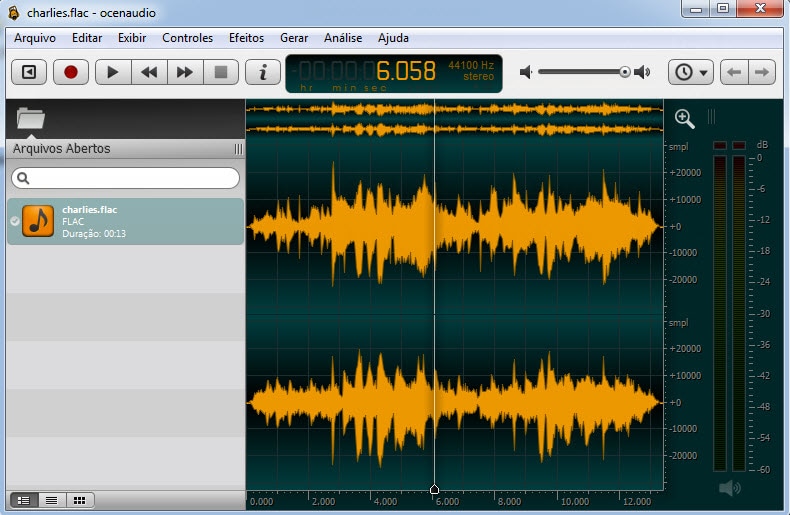
2. MP3 Editor: Audacity
Audacity is free and also has to go for it, a simple and intuitive interface that is easy for beginners. It also has a surprisingly extensive list of features, options, and effects, including spectrographic analysis, undo/redo function, and more.
Audacity supports many formats, including WAV, AIFF, FLAC, MP2, MP3, and OGG.
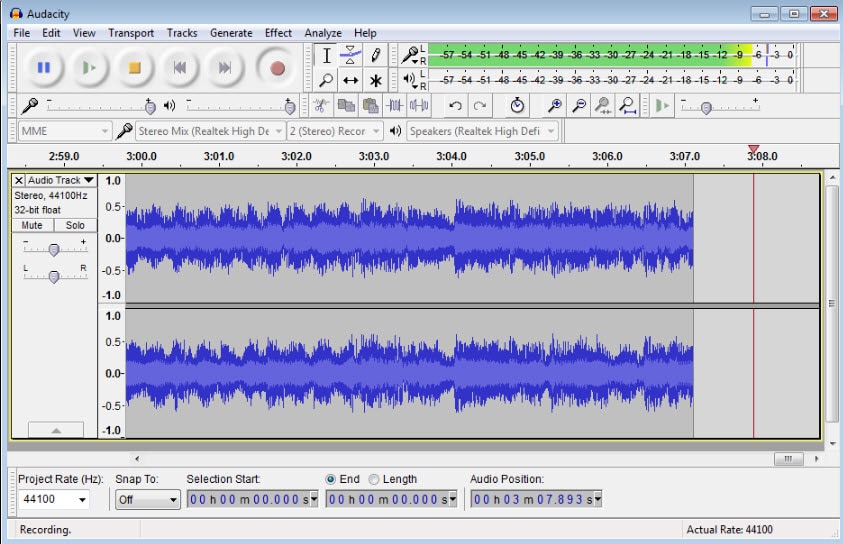
Section 2. Professional Quality Music Editors for Mac
Pay music editing programs for Mac offer a serious boost in performance and an increased number of supported formats and output options.
Two pay music and audio editors for Mac we recommend are:
3. Music Editor: Wondershare Filmora Video & Audio Editor for Mac [Free]
Wondershare Filmora Video & Audio Editor for Mac is often aimed at users who want to edit videos, but this program also offers professional quality performance for editing music and audio. Novice users will appreciate the price and the intuitive interface that allows a gentle learning curve.
Advanced users will like the extensive features and supported formats, including a music library feature. It has slightly fewer features and supported formats than Adobe Audition, but if you don’t need those extra bells and whistles, this is the music editor for Mac for you.
For Win 7 or later (64-bit)
For macOS 10.12 or later
If you are using a windows, check this tutorial instead: Windows Video Editing Software .
4. Sound Editor: Adobe Audition
Adobe Audition comes with a high price at $20/mo. However, users who demand the best will find the cost worth it for a license. It has the most extensive audio and music editing toolset, and it supports the widest range of formats.
A complete range of tutorials also supports adobe Audition to help you get the most from your investment. The fact it takes a while to work through the tutorials and get up to speed might be the only drawback.

Section 3. How to choose Music Editor for Mac users?
Choosing a music editor for Mac, including the ability to edit and output to MP3 and MP4 formats, depends entirely on your needs. If your needs are modest and limited features or functionality work for you, several free-to-use options will get the job done. If you need more robust functionality and professional quality, a pay program will offer more satisfying performance. Keep in mind the following questions when making your choice:
- How often do I need to edit music and audio?
- Do I need simple trim and edit features, or also audio effects?
- What formats are my source files, and what formats do I want to output to?
- What is my budget, and how can I balance performance and price?
With Filmora, you can edit music and audio files with ease. Besides basic cutting features, you can apply fade-in and fade-out effects, adjust the audio volume. What’s more, you can remove the background noise in the audio to get a clear sound.
Versatile Video Editor - Wondershare Filmora
An easy yet powerful editor
Numerous effects to choose from
Detailed tutorials provided by the official channel
So how do you choose a music editor for Mac that can do everything you want? In this article, we will share with you some music editors that you can use on Mac computer. Let’s move on.
Section 1. Free Music Editors for Mac
Free-to-use is great, especially when you get all the performance and features you need in a music editor. Two free music and audio editors for Mac we recommend are:
1. Audio Editor: OcenAudio
OcenAudio has a very extensive toolkit of audio editing capabilities and tools. Still, one of its best features is that it’s easy on your memory: you can edit even very large files without requiring external memory resources.
OcenAudio supports MP3, WAV, FLAC, WMA, and many other audio formats.

2. MP3 Editor: Audacity
Audacity is free and also has to go for it, a simple and intuitive interface that is easy for beginners. It also has a surprisingly extensive list of features, options, and effects, including spectrographic analysis, undo/redo function, and more.
Audacity supports many formats, including WAV, AIFF, FLAC, MP2, MP3, and OGG.

Section 2. Professional Quality Music Editors for Mac
Pay music editing programs for Mac offer a serious boost in performance and an increased number of supported formats and output options.
Two pay music and audio editors for Mac we recommend are:
3. Music Editor: Wondershare Filmora Video & Audio Editor for Mac [Free]
Wondershare Filmora Video & Audio Editor for Mac is often aimed at users who want to edit videos, but this program also offers professional quality performance for editing music and audio. Novice users will appreciate the price and the intuitive interface that allows a gentle learning curve.
Advanced users will like the extensive features and supported formats, including a music library feature. It has slightly fewer features and supported formats than Adobe Audition, but if you don’t need those extra bells and whistles, this is the music editor for Mac for you.
For Win 7 or later (64-bit)
For macOS 10.12 or later
If you are using a windows, check this tutorial instead: Windows Video Editing Software .
4. Sound Editor: Adobe Audition
Adobe Audition comes with a high price at $20/mo. However, users who demand the best will find the cost worth it for a license. It has the most extensive audio and music editing toolset, and it supports the widest range of formats.
A complete range of tutorials also supports adobe Audition to help you get the most from your investment. The fact it takes a while to work through the tutorials and get up to speed might be the only drawback.

Section 3. How to choose Music Editor for Mac users?
Choosing a music editor for Mac, including the ability to edit and output to MP3 and MP4 formats, depends entirely on your needs. If your needs are modest and limited features or functionality work for you, several free-to-use options will get the job done. If you need more robust functionality and professional quality, a pay program will offer more satisfying performance. Keep in mind the following questions when making your choice:
- How often do I need to edit music and audio?
- Do I need simple trim and edit features, or also audio effects?
- What formats are my source files, and what formats do I want to output to?
- What is my budget, and how can I balance performance and price?
With Filmora, you can edit music and audio files with ease. Besides basic cutting features, you can apply fade-in and fade-out effects, adjust the audio volume. What’s more, you can remove the background noise in the audio to get a clear sound.
Versatile Video Editor - Wondershare Filmora
An easy yet powerful editor
Numerous effects to choose from
Detailed tutorials provided by the official channel
So how do you choose a music editor for Mac that can do everything you want? In this article, we will share with you some music editors that you can use on Mac computer. Let’s move on.
Section 1. Free Music Editors for Mac
Free-to-use is great, especially when you get all the performance and features you need in a music editor. Two free music and audio editors for Mac we recommend are:
1. Audio Editor: OcenAudio
OcenAudio has a very extensive toolkit of audio editing capabilities and tools. Still, one of its best features is that it’s easy on your memory: you can edit even very large files without requiring external memory resources.
OcenAudio supports MP3, WAV, FLAC, WMA, and many other audio formats.

2. MP3 Editor: Audacity
Audacity is free and also has to go for it, a simple and intuitive interface that is easy for beginners. It also has a surprisingly extensive list of features, options, and effects, including spectrographic analysis, undo/redo function, and more.
Audacity supports many formats, including WAV, AIFF, FLAC, MP2, MP3, and OGG.

Section 2. Professional Quality Music Editors for Mac
Pay music editing programs for Mac offer a serious boost in performance and an increased number of supported formats and output options.
Two pay music and audio editors for Mac we recommend are:
3. Music Editor: Wondershare Filmora Video & Audio Editor for Mac [Free]
Wondershare Filmora Video & Audio Editor for Mac is often aimed at users who want to edit videos, but this program also offers professional quality performance for editing music and audio. Novice users will appreciate the price and the intuitive interface that allows a gentle learning curve.
Advanced users will like the extensive features and supported formats, including a music library feature. It has slightly fewer features and supported formats than Adobe Audition, but if you don’t need those extra bells and whistles, this is the music editor for Mac for you.
For Win 7 or later (64-bit)
For macOS 10.12 or later
If you are using a windows, check this tutorial instead: Windows Video Editing Software .
4. Sound Editor: Adobe Audition
Adobe Audition comes with a high price at $20/mo. However, users who demand the best will find the cost worth it for a license. It has the most extensive audio and music editing toolset, and it supports the widest range of formats.
A complete range of tutorials also supports adobe Audition to help you get the most from your investment. The fact it takes a while to work through the tutorials and get up to speed might be the only drawback.

Section 3. How to choose Music Editor for Mac users?
Choosing a music editor for Mac, including the ability to edit and output to MP3 and MP4 formats, depends entirely on your needs. If your needs are modest and limited features or functionality work for you, several free-to-use options will get the job done. If you need more robust functionality and professional quality, a pay program will offer more satisfying performance. Keep in mind the following questions when making your choice:
- How often do I need to edit music and audio?
- Do I need simple trim and edit features, or also audio effects?
- What formats are my source files, and what formats do I want to output to?
- What is my budget, and how can I balance performance and price?
With Filmora, you can edit music and audio files with ease. Besides basic cutting features, you can apply fade-in and fade-out effects, adjust the audio volume. What’s more, you can remove the background noise in the audio to get a clear sound.
Versatile Video Editor - Wondershare Filmora
An easy yet powerful editor
Numerous effects to choose from
Detailed tutorials provided by the official channel
So how do you choose a music editor for Mac that can do everything you want? In this article, we will share with you some music editors that you can use on Mac computer. Let’s move on.
Section 1. Free Music Editors for Mac
Free-to-use is great, especially when you get all the performance and features you need in a music editor. Two free music and audio editors for Mac we recommend are:
1. Audio Editor: OcenAudio
OcenAudio has a very extensive toolkit of audio editing capabilities and tools. Still, one of its best features is that it’s easy on your memory: you can edit even very large files without requiring external memory resources.
OcenAudio supports MP3, WAV, FLAC, WMA, and many other audio formats.

2. MP3 Editor: Audacity
Audacity is free and also has to go for it, a simple and intuitive interface that is easy for beginners. It also has a surprisingly extensive list of features, options, and effects, including spectrographic analysis, undo/redo function, and more.
Audacity supports many formats, including WAV, AIFF, FLAC, MP2, MP3, and OGG.

Section 2. Professional Quality Music Editors for Mac
Pay music editing programs for Mac offer a serious boost in performance and an increased number of supported formats and output options.
Two pay music and audio editors for Mac we recommend are:
3. Music Editor: Wondershare Filmora Video & Audio Editor for Mac [Free]
Wondershare Filmora Video & Audio Editor for Mac is often aimed at users who want to edit videos, but this program also offers professional quality performance for editing music and audio. Novice users will appreciate the price and the intuitive interface that allows a gentle learning curve.
Advanced users will like the extensive features and supported formats, including a music library feature. It has slightly fewer features and supported formats than Adobe Audition, but if you don’t need those extra bells and whistles, this is the music editor for Mac for you.
For Win 7 or later (64-bit)
For macOS 10.12 or later
If you are using a windows, check this tutorial instead: Windows Video Editing Software .
4. Sound Editor: Adobe Audition
Adobe Audition comes with a high price at $20/mo. However, users who demand the best will find the cost worth it for a license. It has the most extensive audio and music editing toolset, and it supports the widest range of formats.
A complete range of tutorials also supports adobe Audition to help you get the most from your investment. The fact it takes a while to work through the tutorials and get up to speed might be the only drawback.

Section 3. How to choose Music Editor for Mac users?
Choosing a music editor for Mac, including the ability to edit and output to MP3 and MP4 formats, depends entirely on your needs. If your needs are modest and limited features or functionality work for you, several free-to-use options will get the job done. If you need more robust functionality and professional quality, a pay program will offer more satisfying performance. Keep in mind the following questions when making your choice:
- How often do I need to edit music and audio?
- Do I need simple trim and edit features, or also audio effects?
- What formats are my source files, and what formats do I want to output to?
- What is my budget, and how can I balance performance and price?
With Filmora, you can edit music and audio files with ease. Besides basic cutting features, you can apply fade-in and fade-out effects, adjust the audio volume. What’s more, you can remove the background noise in the audio to get a clear sound.
Versatile Video Editor - Wondershare Filmora
An easy yet powerful editor
Numerous effects to choose from
Detailed tutorials provided by the official channel
Also read:
- [New] 2024 Approved Accelerating Windows Document Analysis
- [New] 2024 Approved Discover 10 Spectacular Reactions on Creative YouTube Videos
- [New] A Comprehensible Approach Uploading Snapchat Images Offline
- [Updated] 2024 Approved Photobooth Glitch Unraveling Video Lags
- [Updated] The Escape Artist's Manual to Disguised YouTube Archives for 2024
- 2024 Approved How to Achieve Pristine Sound Quality Tactics to Reduce Echo
- Blending the Tunes and Pictures A Step-by-Step Guide to Audio Video Integration in Current Technology
- Does Life360 Notify When You Log Out On Nokia G42 5G? | Dr.fone
- Elite Sound Mixers for Superior Stream Quality
- In 2024, 8 Ways to Transfer Photos from Honor 90 Lite to iPhone Easily | Dr.fone
- New In 2024, The Essential Process of Adding Sound to MKV-Updated Videographies
- New The Essential List of Top 10 Audio Editors for Windows & Mac Platforms
- Overcoming Windows 11'S ZeroDXGIErorDeviceHung
- Updated In 2024, Bridging the Gap Between Sound Waves and Storage Space A Guide to Downloading Audio Programs Onto Computers
- Title: Updated 2024 Approved Achieving Clarity in Soundscapes Innovative Techniques for Minimizing Audio Distractions, Online/Offline
- Author: Ella
- Created at : 2025-02-28 23:24:54
- Updated at : 2025-03-03 17:37:45
- Link: https://sound-optimizing.techidaily.com/updated-2024-approved-achieving-clarity-in-soundscapes-innovative-techniques-for-minimizing-audio-distractions-onlineoffline/
- License: This work is licensed under CC BY-NC-SA 4.0.


